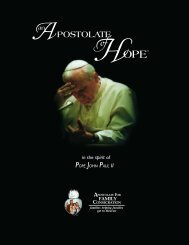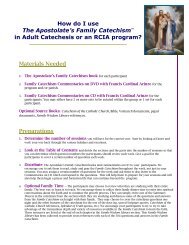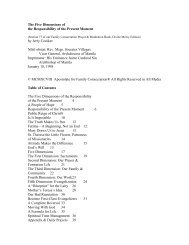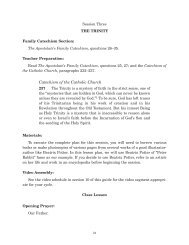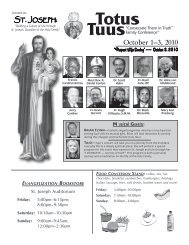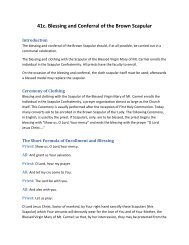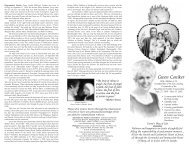20a. - 20k. Divine Mercy Section - Apostolate for Family Consecration
20a. - 20k. Divine Mercy Section - Apostolate for Family Consecration
20a. - 20k. Divine Mercy Section - Apostolate for Family Consecration
Create successful ePaper yourself
Turn your PDF publications into a flip-book with our unique Google optimized e-Paper software.
The Sacrament of Reconciliation became a regular and important part of her life, and she<br />
grew in her understanding of it. She learned that Confession is much more than just asking<br />
and receiving <strong>for</strong>giveness. “We should desire two kinds of profit from Holy Confession,” she<br />
explained:<br />
1. We come to Confession to be healed;<br />
2. We come to be educated — like a small child, our soul has constant need of education<br />
(Diary, 377).<br />
She realized that this need of our souls <strong>for</strong> education — through the grace of God and<br />
through the guidance of the confessor — is vital to our spiritual growth. We cannot simply<br />
rely on ourselves:<br />
“…on its own strength, the soul will not go far; it will exert itself greatly and will do<br />
nothing <strong>for</strong> the glory of God; it will err continually, because our mind is darkened and does<br />
not know how to discern its own affairs” (Diary, 377).<br />
Another important lesson Sister learned was to pray <strong>for</strong> her confessor:<br />
“…I came to understand one thing: that I must pray much <strong>for</strong> each of my confessors, that<br />
he might obtain the light of the Holy Spirit, <strong>for</strong> when I approach the confessional without<br />
first praying fervently, the confessor does not understand me very well. Father encouraged<br />
me to pray fervently <strong>for</strong> these intentions, that God would give better knowledge and<br />
understanding of the things He is asking of me” (Diary, 647).<br />
Through Sister Faustina, Christ Himself instructs us how to prepare <strong>for</strong> the reception of<br />
the sacrament:<br />
“…when you go to confession, to this fountain of My mercy, the Blood and Water which<br />
came <strong>for</strong>th from My Heart always flows down upon your soul and ennobles it. Every time<br />
you go to confession, immerse yourself entirely in My mercy, with great trust, so that I may<br />
pour the bounty of My grace upon your soul” (Diary, 1602).<br />
Repeatedly, He emphasizes that the confessional is the place of the greatest mercy, and<br />
that it is He, Himself, <strong>Mercy</strong> Incarnate, who waits <strong>for</strong> us there:<br />
“When you approach the confessional, know this, that I Myself am waiting there <strong>for</strong> you. I<br />
am only hidden by the priest, but I Myself act in your soul. Here the misery of the soul<br />
meets the God of <strong>Mercy</strong>” (Diary, 1602)<br />
“My daughter, just as you prepare in My presence, so also you make your confession be<strong>for</strong>e<br />
Me. The person of the priest is, <strong>for</strong> Me, only a screen. Never analyze what sort of a priest it<br />
is that I am making use of, open your soul in confession as you would to Me, and I will fill<br />
it with My light” (Diary, 1725).<br />
He stresses, too, that no matter how great our sin, His mercy is greater and can restore<br />
us to His grace:<br />
“Were a soul like a decaying corpse so that from a human standpoint, there would be no<br />
[hope of] restoration and everything would already be lost, it is not so with God. The<br />
miracle of <strong>Divine</strong> <strong>Mercy</strong> restores that soul in full” (Diary, 1448).<br />
Our sinfulness, then, cannot keep us from receiving His <strong>Mercy</strong>. Only our fear and refusal<br />
to trust in Him can block His love. So Our Lord urges Sister Faustina:<br />
“Pray <strong>for</strong> souls that they be not afraid to approach the tribunal of My <strong>Mercy</strong>. Do not grow<br />
weary of praying <strong>for</strong> sinners…Tell souls that from this fount of mercy souls draw graces<br />
solely with the vessel of trust. If their trust is great, there is no limit to My generosity”<br />
(Diary, 975, 1602).<br />
The Church, likewise, continues to exhort us to make frequent use of this Sacrament of<br />
Reconciliation, even monthly, to draw on this infinite fount of mercy. John Paul II has a<br />
special concern that we make use of the Sacrament and be healed of one of the great sins of<br />
our age — the loss of the sense of sin.





